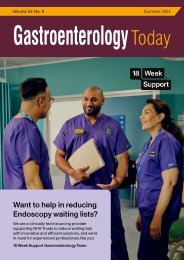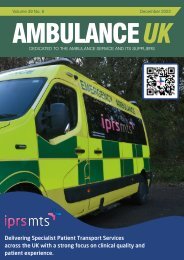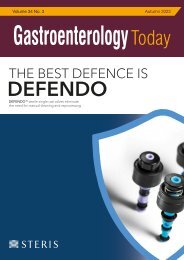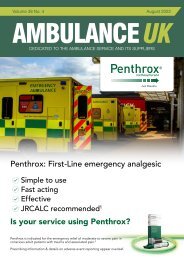Gastroenterology Today Winter 2022
Gastroenterology Today Winter 2022
Gastroenterology Today Winter 2022
Create successful ePaper yourself
Turn your PDF publications into a flip-book with our unique Google optimized e-Paper software.
FEATURE<br />
Participants, and interventions<br />
The target population were all patients with IBD.<br />
(5/15) [17-20, 27], following by Fatigue/malaise (4/15) [17, 18, 20, 27]<br />
and Myalgia (4/15) [17, 18, 20, 27].<br />
Study appraisal and synthesis methods<br />
Full texts of the studies were evaluated by three authors [MR, ET, RSM];<br />
they decided whether these met the inclusion criteria, independently.<br />
They resolved any disagreement through discussions, and finally the<br />
articles were selected based on consensus. Neither of the authors were<br />
blind to the journal titles or to the study authors or institutions. Then, the<br />
level of evidence of each study was determined [16]. The following data<br />
were extracted from the included studies and recorded in a Microsoft<br />
Excel sheet, 2016: study authors, country, title, methods, sample size,<br />
and main findings [MS, EZ, RSM, ET, MR].<br />
Ethical issues<br />
Ethical issues (including plagiarism, informed consent, misconduct, data<br />
fabrication and/or falsification, double publication and/or submission,<br />
redundancy, etc.) have been completely observed by the authors.<br />
Discussion<br />
In this systematic scoping review, fifteen studies were assessed, which<br />
that the obtained results were summarized in two areas. Here, we will<br />
discuss the findings.<br />
The effect of vaccination<br />
Caldera et al. revealed that all control group and 97% of patients with<br />
IBD developed antibodies. Antibody concentrations were lower in<br />
patients with IBD. Those who received Moderna had higher antibody<br />
concentrations compared with those who received the Pfizer vaccine<br />
series. Also, patients on immunemodifying therapy had lower antibody<br />
concentrations compared with those who were on no treatment,<br />
aminosalicylates, or vedolizumab [14].<br />
GASTROENTEROLOGY TODAY - WINTER <strong>2022</strong><br />
Results<br />
In total, 212 (69 articles in Medline, 60 articles in Scopus, 33 article<br />
from Science Direct, 2 articles from Cochrane, and 48 articles from<br />
other resources) were achieved at the first step search. After initial<br />
assessment, 65 duplications were found. After the identification and<br />
the screening, 147 articles were selected as potential studies. After<br />
reading the full text of these articles, 15 articles formed the final sample<br />
and considered for the final data extraction [10, 14, 17-29]. Interrater<br />
agreement following the first round of screening between the<br />
investigators was 85% (Cohen’s k =0.67). Within the second round<br />
of screening, inter-rater agreement rose to 100%. Table 2 shows the<br />
summary of these studies.<br />
Thirteen (13/14) studies were peer-reviewed [10, 14, 17-24, 26-29]<br />
and 1/14 of them was in-review article [25]. All included studied were<br />
research study, and 12/15 had prospective design [10, 14, 17, 19-24,<br />
26-29] and 4/15 were based on registries [10, 17, 21, 24]. Totally, 8/15<br />
studies were performed in single-center settings [14, 18, 20, 22, 25,<br />
27-29]. In 8/15 studies, patients with IBD were compared with a control<br />
group [10, 14, 18, 19, 21, 25, 27, 28].<br />
The studied patients were vaccinated with one of mRNA SARS-CoV-2<br />
such as.<br />
Pfizer (mRNA), Moderna (mRNA), Janseen & AstraZeneca (vector),<br />
and AstraZeneca (vector). One study mentioned the most prevalent<br />
causes of vaccination refusal in patients with IBD, such as fear of side<br />
effects, lack of confidence in the vaccine development process, and little<br />
information about vaccination [20]. We summarized the results in two<br />
categories: (1) the effect of vaccination, and (2) side effects.<br />
The effect of vaccination were assessed in 13/15 studies [10, 14, 18,<br />
19, 21-24, 26-29]. Measuring antibodies was performed in 10/15<br />
studies [14, 18, 19, 22-24, 26-29]. Side effects of Covid-19 vaccination<br />
in patients with IBD were reported in 7/15 studies [17-21, 27, 28]. The<br />
mentioned side effects in evaluated articles are presented in Table 3.<br />
Localized injection-site were the most common side effect in the studies<br />
Also, Cerna et al. stated that the post vaccine seropositivity rate among<br />
IBD patients and controls was 97.8% vs 100%. Median anti-Covid-19<br />
IgG levels were lower among IBD recipients of AstraZeneca compared<br />
with 2 other vaccines and control AstraZeneca recipients. These were<br />
no correlation between serum trough levels and anti-Covid-19 IgG<br />
concentrations for any of the biological drugs used. The TNF-α inhibitors<br />
with concomitant immunosuppressive treatmen,t but no other treatment<br />
modalities were associated with a lower postvaccination antibody<br />
response. The laboratory activity of IBD evaluated by C-reactive<br />
protein and fecal calprotectin levels. However, there were no significant<br />
differences before the vaccination and 8 weeks after its completion [28].<br />
Classen et al. reported that all patients with IBD (100%) developed an<br />
immune response after full vaccination. Also, there was no significant<br />
difference in antibody levels between the 3 different vaccines received<br />
upon first vaccination. The kind of IBD disease and medication had<br />
no significant effect on the level of antibody titers. Also, they found<br />
that compared to the healthy group, reduced antibody response was<br />
detected. There was no vaccination failure in the IBD group after 2<br />
doses vaccinations. In patients with IBD, antibody titers were positively<br />
associated with days between last vaccination and blood sample taken,<br />
whereas in the control group, antibody titers negatively correlated<br />
with the days after dose 1. Moreover, the days between two doses of<br />
vaccination had no impact on antibody response in both groups [18].<br />
Similarly, Levin et al. showed a 95% overall response rate after Covid-19<br />
vaccination. Also, none of the patients with positive results for spike<br />
domain antibodies had elevations of nucleocapsid antibodies, suggesting<br />
a true vaccine response rather than prior undiagnosed infection. In<br />
patients with elevated spike domain antibodies (a true vaccine response<br />
rather than prior undiagnosed infection), 89% had the highest measurable<br />
levels, at > 250.00 U/mL, with assay reference ranges of 0.79 U/mL<br />
indicating negative and 0.80 U/mL (positive results) [29].<br />
Lev-Tzion et al. indicated that overall 0.3% developed Covid-19<br />
after vaccination. Infection rates were slightly higher in the<br />
unvaccinated IBD patients compare to non IBD patients.<br />
Also, patients on tumor necrosis factor (TNF) inhibitors and/or<br />
corticosteroids did not have a higher incidence of infection.<br />
12

















